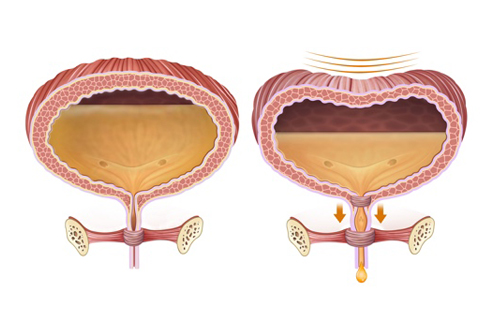Urinary Incontinence
Urinary incontinence, the involuntary leakage of urine, affects millions of people worldwide, impacting their quality of life and daily activities. Understanding its types, causes, symptoms, and treatment options can help manage this condition effectively.

Understanding Urinary Incontinence
Urinary incontinence is the loss of bladder control, ranging from occasional leaks when sneezing or coughing to a sudden, strong urge to urinate that doesn't allow time to get to a bathroom. It can affect anyone but is more common in older adults and women.
Types of Urinary Incontinence
Urinary incontinence comes in various forms, each with different underlying causes and treatments:
1. Stress Urinary Incontinence
Stress incontinence occurs when physical activities such as coughing, sneezing, laughing, or exercising put pressure on the bladder, causing urine to leak. It is often linked to weakened pelvic floor muscles.
2. Urge Urinary Incontinence
Urge incontinence is characterized by a sudden, intense urge to urinate followed by an involuntary loss of urine. It can be caused by a range of conditions, including infections and neurological disorders.
3. Overflow Urinary Incontinence
Overflow incontinence happens when the bladder doesn't empty completely, leading to overflow and leakage. It can result from blockages, weak bladder muscles, or nerve damage.
4. Mixed Urinary Incontinence
Mixed incontinence is a combination of stress and urge incontinence, presenting symptoms of both types. It is essential to address both underlying causes for effective management.
Causes and Risk Factors of Urinary Incontinence
Common causes and risk factors include:
- Age-related changes in bladder function
- Pregnancy and childbirth
- Menopause
- Prostate issues in men
- Neurological disorders
- Obesity
- Smoking
- Certain medications and chronic illnesses
Signs and Symptoms of Urinary Incontinence
Symptoms vary depending on the type of incontinence and can include:
- Frequent or urgent need to urinate
- Leakage during physical activities
- Inability to reach the toilet in time
- Constant dribbling of urine
- Nocturia (waking up to urinate at night)
Diagnosis of Urinary Incontinence
Diagnosis involves a thorough medical history, physical examination, and tests such as:
- Urinalysis to check for infections
- Bladder diary to track symptoms and patterns
- Post-void residual measurement to assess bladder emptying
- Urodynamic testing to evaluate bladder function
- Cystoscopy to examine the bladder and urethra
Treatment Options for Urinary Incontinence
Treatment depends on the type and severity of incontinence and can include lifestyle changes, medications, exercises, medical devices, and surgery.
Behavioral Techniques
Behavioral techniques such as bladder training and scheduled toilet trips help manage symptoms by increasing the time between urinating and reducing urgency.
Medications
Medications can help relax the bladder or increase its capacity, reducing the symptoms of urge and stress incontinence.
Pelvic Floor Exercises (Kegel Exercises)
Kegel exercises strengthen the pelvic floor muscles, improving bladder control and reducing leakage, especially in stress incontinence.
Medical Devices (e.g., Pessaries)
Medical devices such as pessaries support the bladder and urethra, helping manage stress incontinence, especially in women.
Surgical Options
Surgical options, including sling procedures and bladder neck suspension, provide long-term relief for severe cases of urinary incontinence.
Hyderabad MultiSpeciality Hospital's Approach to Urinary Incontinence
At Hyderabad MultiSpeciality Hospital, we offer a comprehensive and personalized approach to urinary incontinence treatment, combining advanced medical technology with compassionate care to improve our patients' quality of life.
Specialized Clinics and Services
Our specialized clinics provide targeted care for urinary incontinence, offering a range of services from diagnostic testing to individualized treatment plans.
Support and Counseling for Urinary Incontinence
We provide support and counseling to help patients cope with the emotional and social impacts of urinary incontinence, ensuring they receive the holistic care they need.
Patient Experiences and Success Stories
Our patients' success stories highlight the effectiveness of our treatments and the compassionate care provided by our medical team, inspiring hope and confidence in those affected by urinary incontinence.
FAQs About Urinary Incontinence
1. What are the common causes of urinary incontinence?
Common causes include age-related changes, pregnancy, childbirth, menopause, prostate issues, neurological disorders, obesity, smoking, and certain medications.
2. How is urinary incontinence diagnosed?
Diagnosis involves medical history, physical examination, urinalysis, bladder diary, post-void residual measurement, urodynamic testing, and cystoscopy.
3. What treatment options are available for urinary incontinence?
Treatment options include behavioral techniques, medications, pelvic floor exercises, medical devices, and surgical options.
4. Can urinary incontinence be cured?
Many cases can be effectively managed or cured with appropriate treatment, lifestyle changes, and medical interventions.
5. How does Hyderabad MultiSpeciality Hospital approach urinary incontinence treatment?
We offer a personalized, comprehensive approach with specialized clinics, advanced treatments, and supportive care.
Cost and Insurance Coverage
Understanding the cost of urinary incontinence treatment and insurance coverage is crucial. Our financial counselors are available to help you navigate your insurance benefits and payment options.
Contact Us for More Information About Urinary Incontinence
For more information or to schedule a consultation, please contact Hyderabad MultiSpeciality Hospital. Our dedicated team is here to provide the support and care you need.
